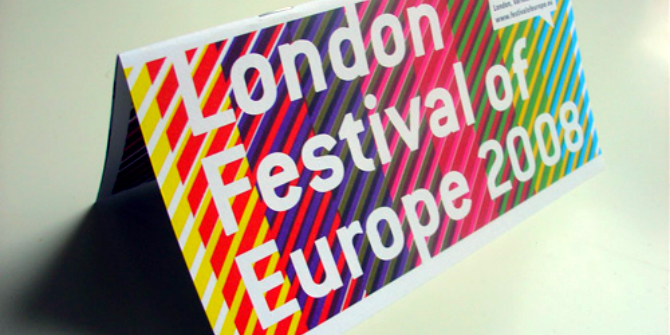 The High Court ruling on Article 50 and the government’s plans to appeal the judgment to the Supreme Court, which will probably hear it at the beginning of December, have significant implications for the kind of Brexit that may take place, and indeed may affect whether it takes place at all. Niccolo Milanese argues this is the case because, for the time being at least, the EU is not a foreign entity and remains part of the British political and social landscape.
The High Court ruling on Article 50 and the government’s plans to appeal the judgment to the Supreme Court, which will probably hear it at the beginning of December, have significant implications for the kind of Brexit that may take place, and indeed may affect whether it takes place at all. Niccolo Milanese argues this is the case because, for the time being at least, the EU is not a foreign entity and remains part of the British political and social landscape.
The summary of the judgment of the court shows that the basis of its reasoning is that the European Union cannot be treated as a foreign entity with which the UK has a treaty or an agreement. The UK government’s argument to avoid a parliamentary vote was based on the premise that the UK’s relationship with the EU is akin to a treaty with another sovereign country, and in these matters of international relations, the government has what is called ‘crown prerogative’, which means it can take legally binding decisions without consulting parliament as it has to do with domestic affairs. In the case of the EU, the government admitted that leaving the EU would imply changes to domestic legislation. The court pointed out the obvious contradiction here: if leaving the EU implies changes to domestic legislation, then clearly the relationship with the EU is not purely like that of an international agreement or treaty. You can’t treat the EU as if it were a foreign country, at least, not until you have left the European Union, at which point it would indeed be a foreign entity.
That the government used the argument that the EU is akin to a foreign country falls into a pattern of thinking that has been easy to notice amongst those in favour of Brexit: that which is taken to be a troubling element in their worldview is identified as ‘foreign’ and an attempt is made to cast it out of the British body-politic.
It is partly disingenuous to refer to this attitude to as a ‘little Englander’ mentality, and not only because it is not only ‘Englanders’ that are subject to it. The mentality is not totally closed-in on an island called ‘England’: it is fundamentally an expression of a nation-based world-view in which the British people are best represented by British institutions and representatives alone, just as other nationalities are best represented by their own institutions and representatives. This is a pure form of believing the world is best ordered as nation-states, and there are clear entities called ‘nationalities’ which fit into this ordering. Those who subscribe to this world-view do not necessarily see any problem with entering into (commercial, military, student exchange) relations with other peoples constituted like this, ie. other nations, and it is also internally coherent to this view to treat foreigners with respect, and so they do not recognize themselves in allegations of racism or xenophobia. As many who hold the view are quick to point out, much of the world is ordered in this way, and has been for many years.
The problem with this ‘national’ world-view is that it does not correspond to reality either of contemporary UK, nor of any part of the European Union
The problem with this ‘national’ world-view is that it does not correspond to reality either of contemporary UK nor of any part of the European Union: in reminding everyone that European Union law becomes domestic law, the court has done nothing but reiterate the legal aspects of this. This is, of course, precisely why many of those in favour of Brexit are in favour of Brexit. It is a matter, they would put it, of sovereignty.
The slogans of ‘taking back control’ of ‘taking back our country’ speak precisely to people who have a world-view which is not reflected in the social and political reality of the United Kingdom. It is natural for these people to say that they feel like strangers in their own home, that the UK has somehow become a ‘foreign’ country. This has to do with more global changes than the UK’s relationship with the European Union, but the EU has become the name of this ‘foreign’ element, and of course migrants have become the embodiment of this foreignness.
Ironic, but understandable, is that many of those who supported the UK remaining in the European Union express their dismay at the referendum result and contemporary UK politics as if their country had been taken over by foreigners. It is not uncommon to hear also from this side the complaint ‘I want my country back’. There is again the reflex to cast out of the body-politic a foreign or troubling element. Regional nationalisms in the UK are another expression of this tendency: they project what they disagree with onto a foreign power or center, in this case Westminster. Through this ideological process the UK is feeling like a foreign country for more and more of the people living there, and whilst regional separatism could be an option for some parts of the country to resolve this uncomfortable feeling, for the country as a whole this is not a solution to the deep social fracture expressed by the referendum result.
Those pushing for Parliament to have a greater role in the process of negotiating the UK’s exit from the European Union have often put their argument in terms of finding national unity. Ed Milliband, for example – the former leader of the Labour party who has been the most visible spokesperson for the view that parliament should have a strong role – argues any government, looking at the referendum result, would look for how to find a consensus about the way forward, and Parliament is a place in which this consensus can be found. The problem is it is not clear that there is any form of Brexit which can receive consensus from the population: opponents criticize the government for not having a plan, surely recognizing there is likely no possible plan that would be consensual. Either it will be regarded as far too soft by many of those who voted for the UK to leave the European Union, or it will result in an unprecedented loss of rights about which those who voted to stay in the European Union and value those rights could justifiably feel very unhappy.
Distrust of politicians and political institutions is likely to grow
The social fracture which the referendum result reflects potentially goes deeper than anything Parliament can resolve and is ultimately a political fracture. Distrust of politicians and political institutions is likely to grow as a result: this distrust is fed by political institutions no longer able to achieve consensus and legitimacy, and the more they are distrusted, the more they are illegitimate. This is potentially the death cycle of political institutions, unless they act in a way which pulls quite forcefully the people back into line. This is partly what is happening, and which side of an ‘unruly’ referendum is going to be pulled back into line is what is currently discussed by the UK elites.
The situation is made worse by two factors. Firstly, the main UK opposition party, Labour, very quickly acknowledged the result of the referendum as decisive. By doing so, they fell into a trap: the referendum was advisory, but plenty of people on the winning side, in tabloid media, and in the ranks of the Tory party have an interest in pretending it was obligatory. By following the (new) government’s line on this, the Labour party positions itself as respecting democracy, when it is plain that it is simply weak: pretending an advisory referendum is obligatory is not respecting anything other than (deliberate) confusion. This is not to advocate that the Labour parliamentarians should not pay attention to what the people it represents are saying, but it does have a role precisely as the opposition in the parliament to ensure that the view of the minority is heard and taken into consideration. That is what parliamentary democracy is about, and the way it ensures that a ‘tyranny of the majority’ does not impose itself. One could perfectly reasonably advocate that the UK should move to a constitutional model in which referenda play a more important role, like other countries such as Switzerland; but that is not currently the case, and it is a mistake to pretend it is. As a result, at the moment many of the 48% of voters in the referendum who voted ‘remain’ are at risk of feeling like their voice is not being taken into consideration. This is not the way to work towards consensus; it is a way of creating alienation.
Secondly, the European Union has largely forgotten that if it is not foreign to the UK, the UK is also not a foreign country with regard to the EU. UK citizens are represented in the structures of the European Union, the Commission, the Council and the Parliament, and they will be until the UK leaves. Therefore it is not the case that the UK government represents the UK citizens, and the EU institutions represent all the other Europeans. If European politicians make it look like there is this divide, they are also failing in their obligation to represent and protect UK citizens, and those on the ‘remain’ side of the argument, those who risk losing European rights which they hold to be valuable, are again facing a deficiency of political representation.
For these two reasons and until this situation changes, the likelihood remains that no consensus throughout the country about Brexit will be found in the short term and those who voted ‘Remain’ in the referendum will be pulled ‘kicking and screaming’ out of the European Union and lose many if not all of the rights associated with this. The ideology of nation-states is currently holding most of the winning cards but will face its own contradictions in winning. As Europeans watch the United Kingdom almost literally pull itself apart over its relationship with the European Union, we may do well to keep in mind the dangers of starting to think and act as if the EU were a foreign country, however, dissatisfied or unhappy with it we may be: the EU is not a foreign entity with which we might have better or worse relations, it is us and a condition of our being together.
An earlier version of this article was published on European Alternatives. This post represents the views of the author and not those of the Brexit blog, nor the LSE. Image by Rasha Design: Public Domain.
Niccolo Milanese is chair of European Alternatives, a civil society organisation promoting democracy, equality and culture beyond the nation-state.








Yet another insightful piece which I agree 100% with. When I want to be up to speed on Brexit developments I always look first at the latest posts on this blog.
There is no emotion here, simply a calm assessment of all the facts, at regional UK level, national UK level, European level, and international level.
The mainstream media are currently full of virulent propaganda, both for and against Brexit, and it is very difficult to see the wood for the trees.
To complicate things further, we now have the added worry of an incoming Trump Presidency, which is certainly “Brexit plus, plus, plus”.
Here we go again, an academic who feels he know what us leavers want??? People up and down the length of this country, are tired of political figures preaching this liberal movement.From forecasters, academics and so called professionals constant doom gloom. What you all seem to forget is that there are a fare share of the UK public already living in this doom and gloom that are quite rightly prepared to see change. This change is about us thinking about what is happening on this island to heel the wounds here, and believe me their are many.